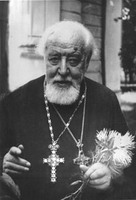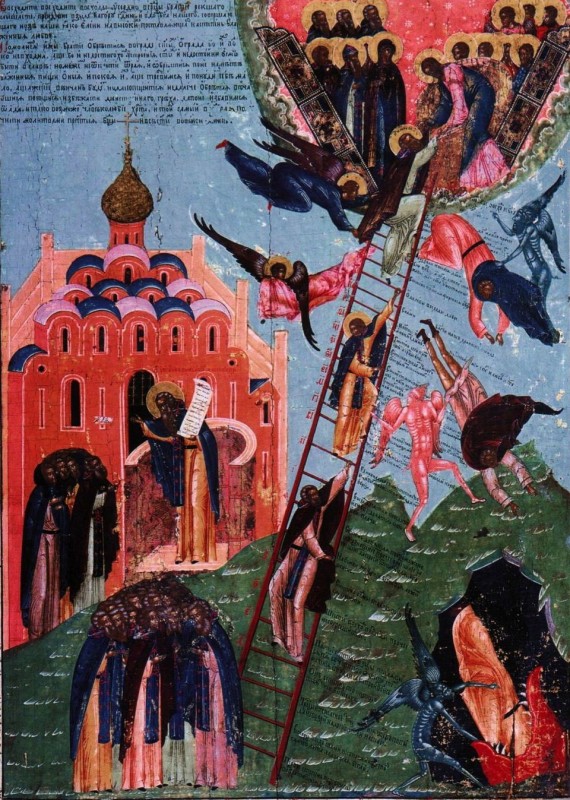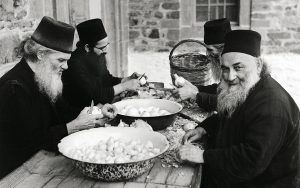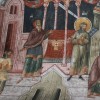And one of the multitude answered and said, Master, I have brought unto Thee my son, which hath a dumb spirit: and wheresoever he taketh him, he teareth him, and he foameth, and gnasheth with his teeth, and pineth away: and I spoke to Thy disciples that they should cast him out, and they could not. He answereth him, and saith, O faithless generation, how long shall I be with you? how long shall I suffer you? Bring him unto Me. And they brought him unto Him: and when he saw Him, straightway the spirit tore him, and he fell on the ground, and wallowed foaming. And He asked his father, How long is it ago since this came unto him? And he said, Of a child. And ofttimes it hath cast him into the fire, and into the waters, to destroy him: but if Thou canst do anything, have compassion on us, and help us. Jesus said unto him, If thou canst believe, all things are possible to him that believeth. And straightway the father of the child cried out, and said with tears, Lord, I believe, help Thou my unbelief. When Jesus saw that the people came running together, He rebuked the foul spirit, saying unto him, Thou dumb and deaf spirit, I charge thee, come out of him, and enter no more into him. And the spirit cried, and rent him sore, and came out of him, and he was as one dead, insomuch that many said, He is dead. But Jesus took him by the hand, and lifted him up, and he arose. And when He was come into the house, His disciples asked Him privately, Why could not we cast him out? And He said unto them, This kind can come forth by nothing, but by prayer and fasting (Mark 9:17-31).
 A large part of Great Lent has already gone by. The fifth week is beginning, which is a very difficult and arduous path of repentance, a path of our faith in God and in the human person, in his higher calling: his Divine sonship, brothers and sisters. Repentance is not a denial of true humanity, of human strength, of human vocation in this world. Repentance is a condemnation of that impurity, of those infirmities of ours, that prevents the uncovering of this true humanity in us. Repentance is never simply a condemnation of impurity in itself or simply a vision and condemnation of sin. Repentance is always an effective battle with sin in order to uncover in ourselves those radiant depths of true humanity of which the Church is always reminding us during the Sundays of Great Lent.
A large part of Great Lent has already gone by. The fifth week is beginning, which is a very difficult and arduous path of repentance, a path of our faith in God and in the human person, in his higher calling: his Divine sonship, brothers and sisters. Repentance is not a denial of true humanity, of human strength, of human vocation in this world. Repentance is a condemnation of that impurity, of those infirmities of ours, that prevents the uncovering of this true humanity in us. Repentance is never simply a condemnation of impurity in itself or simply a vision and condemnation of sin. Repentance is always an effective battle with sin in order to uncover in ourselves those radiant depths of true humanity of which the Church is always reminding us during the Sundays of Great Lent.
The first Sunday of Great Lent, the Triumph of Orthodoxy, is dedicated to remembering the Ecumenical Council at which it was decreed that God could be depicted on icons, because God Himself inscribed His image in the human person at his creation. The Lord Jesus Christ was incarnate in human nature because it conforms to the Divine nature, bearing the image of God in itself. It is this image of God that we must uncover in ourselves.
The first week of Great Lent went by and on the Sunday of the Triumph of Orthodoxy we received this reminder: you see how much sin there is in you, how much impurity, but you know that inscribed in you is God’s image, which you must uncover! The human person is called to Divine sonship, to the uncovering in himself of the true humanity that is Divine sonship.
When the second Sunday of Great Lent arrived, the Church put us face to face with the teaching of St. Gregory Palamas about how the human person partakes of the Divine. “We are partakers of the Divine,” Palamas taught. And that Divine power that is present in this world, that participation, is uncovered in us. With the help of this power, we can indeed become possessors of the Kingdom of God while still living on earth; we can feel, know, and experience those good things that are granted through the participation of human nature in the Divine nature, in God.
Three weeks of Lent went by. Another Lenten Sunday arrived. The Cross was borne into the middle of the church. We bowed down in veneration before the Cross. Why? Because the Cross contains an invincible, incomprehensible, Divine power, with the help of which true humanity in uncovered in the human person: Divine sonship. No matter how difficult it is for us to live, no matter how much the passions torment us, no matter how terrible they may be, the image of God within us remains ineradicable. And this ineradicable image of God should always be in our consciousness; we should always recall it! With God’s grace-filled help, this image can be uncovered and become effective is us, and our life will become such that we will confess Divine sonship not just abstractly in our belief, but will feel within ourselves that we are sons of God.
The Church speaks to us about this on this next, fourth Sunday. It places us before the face of the great preacher of repentance, that great and holy ascetic struggler, St. John Climacus, who taught us how to live, where and how to seek God’s help, and how to use God’s help to attain our higher calling.
John Climacus lived in the sixth century and struggled in asceticism on Sinai. As you likely know, the Sinai monastery, which exists to this day, was established in Palestine. He is called “of the Ladder” because, having lived a long life (first for more than twenty years in obedience to his Elder, and then functioning as an Elder himself for forty years), he was asked by his disciples to write a book, which he called The Ladder. Do you remember, brothers and sisters, Jacob’s ladder in the Old Testament? In his dream he saw a ladder connecting heaven and earth, a ladder upon which the angels ascended and descended. John Climacus wrote his book and called it The Ladder, because in it he presents all the rules of the spiritual life that can help anyone ascend this ladder to the very heavens. He teaches us how to battle against the passions and sin that violate the image of God in us. He teaches in great detail about every passion that torments us and about how we can battle against it. Can I retell in a short sermon how to battle against every passion that torments us? Of course not! But I would like to convey something to you from the teaching of John Climacus about this battle with the passions.
I want to say something about how he teaches us to battle against a passion that now, in our days, torments everyone very much. This passion is all the more terrible for us in that we have gotten used to it, in that we hardly notice its action in us, and that we very often condone it or even think that it does not give rise to any particular sins or separate us from God, as though it were nothing terrible. And yet John Climacus considered it quite terrible. This passion is vainglory.
Our children are taught to seek praise. And we ourselves all seek praise. I very much want to please everybody. I want everybody to praise me for one thing, for another thing, and for a third thing: how well I think, how well I feel, and how nicely and well I dress. I want to please everybody! This is what vainglory is. Even in our spiritual lives, Christians frequently want to please not only people, but even God Himself. And the vaingloriously person cannot stand it when, instead of praise, he hears some kind of reproof, when he does not especially please someone. When the people around him notice some kind of shortcoming in him, he gets offended. This life of constantly being offended – “I’m not appreciated” – is slavery to vainglory.
Vainglory is a very terrible passion: small and unnoticed, but very terrible. Listen to what John Climacus has to say about vainglory: “Vainglory beams on all activities. For instance, I am vainglorious when I fast, and when I relax the fast in order to be unnoticed I am again vainglorious over my prudence. When well-dressed I am quite overcome by vainglory, and when I put on poor clothes I am vainglorious again. When I talk I am defeated, and when I am silent I am again defeated by it. However I throw this prickly-pear, a spike stands upright” [22:5].
“Every lover of self-display is vainglorious. The fast of the vainglorious person is without reward and his prayer is futile, because he does both for the praise of men” [22:7]. The vainglorious person is an idolater. He thinks that he is honoring God, but in fact he is not pleasing God, but rather people and himself. Vainglory is the squandering of labors; it is loss and dissipation. It is the thief of spiritual treasures, an ant on the threshing floor of life that, although small, is always ready to snatch away and steal all the fruits of our ascetic struggles. See how terrible it is!
How should we battle against vainglory? John Climacus teaches us how we should battle against it and against all other passions as well. He says: One needs to descend into the radiant depths of humble-mindedness. Now vainglory pushes me to want to please people. But out of humility I will tell myself: there is nothing in me that is pleasing to people; I cannot please them in any way. And when I will not please them, I will not be offended, because I will recognize that there is nothing pleasing in me.
Once a visitor approached a holy man who was in holy orders and said to him: “You know, I’ve heard that you aren’t smart, that you’re simply stupid. This rather confuses me. I don’t know whether I should listen to you or not, since you’re stupid!” This was said in even harsher terms. And this holy man, with extraordinary meekness and the sincerest humility, said to him: “That’s just what I am!” He thought to himself: “There are many smart people and I, of course, cannot stand alongside them.”
Meekness! John Climacus writes that meekness should always counteract any passion, and vainglory above all. One should accept insults with great meekness, accept lack of praise with great meekness, and live with great meekness – but with meekness that fills the depths of one’s soul. This is what “descending into the radiant depths of humble-mindedness” means. After all, God resisteth the proud, and giveth grace to the humble (Proverbs 3:34; James 4:6; 1 Peter 5:5). It is only in this way that we can receive that grace-filled power with which we can uncover our conformity with God Himself, the image of God, the true humanity in the human person! Only in this way!
By ascending the steps of this ladder, the human person becomes perfect, as he should be, in conformity with his human vocation. What is the perfect person? What kind of life does he have? It is when he can say with the Apostle Paul: Yet not I, but Christ liveth in me (Galatians 2:20), when he has fought the good fight, finished the course, and kept the Orthodox faith (cf. 2 Timothy 4:7). Amen.
Delivered on April 13, 1975.




















